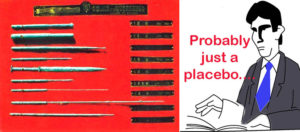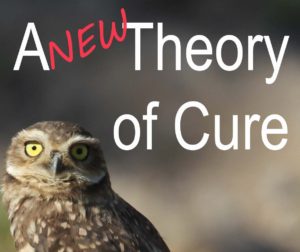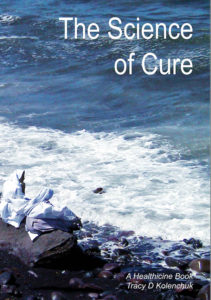Are the benefits of acupuncture just placebo effects? Unfortunately, “probably just a placebo effect” is simplistic nonsense. Let’s begin with a clear look at the placebo effect, starting with Webster’s dictionary:
Placebo Effect (Webster’s)
“improvement in the condition of a patient that occurs in response to treatment but cannot be considered due to the specific treatment used”
Phrase by phrase:
- An improvement in the condition of the patient
- That occurs in response to treatment
- But cannot be considered due to the treatment.
It’s a logical paradox. “In response to treatment” but “cannot be due to the treatment”. How is this possible? It’s not possible. Then begins a bunch of hand-waving, rationalization, and an ever-growing complexity of explanations for what is obviously unexplainable. There is a logic problem with the definition of placebo effect, that has nothing to do with acupuncture. It’s a failure of conventional medical thought.
It’s not hard to understand when we add some explanatory text to the standard definition. Here’s a more accurate version of Placebo Effect:
- An improvement in the condition of the patient, as observed by a doctor
- Following a treatment, observed or acknowledged by the doctor, but not necessarily administered by the doctor.
- Where the doctor does NOT know the cause of the improvement. If the doctor knows the cause of the improvement, it’s not a placebo effect, it’s a real effect with a real known cause. Note: every improvement has a real cause. Every effect is real and has a real cause.
- Where the improvement cannot be considered due to said treatment, in the opinion of the observing doctor.
Suddenly, it’s no longer a placebo effect, it’s an improvement of unknown cause that, in the opinion of the doctor, was not caused by the treatment. Placebo effects have been busted.
Doctor’s Opinion
If we remove the doctor’s opinion, it becomes simply “an improvement of unknown cause”.
If we replace the doctor’s opinion with a Traditional Chinese Medicine doctor, it becomes a “real effect” with a real known cause – acupuncture. The mystery disappears.
But, what about science? What does science think? Science does not think. People think. When people think incorrectly, with or without science, they produce nonsense, sometimes “scientific nonsense”.
How can we spot scientific nonsense? One good way is to look for paradoxes. The current definition of placebo effect is a paradox.
There is another useful view. A very revealing view.
Placebo Cure?
Does acupuncture cure any medical conditions? I bet we can’t find a single disease or medical condition that can be scientifically proven cured by acupuncture.
But it’s a trick question. Acupuncture is used to treat non-infectious diseases. Acupuncture is often used to treat chronic diseases.
Can any disease or medical condition normally treated with acupuncture, be cured by conventional medicine? No. Not one.
In conventional medicine, cured is not defined for any non-infectious disease – and all chronic diseases are considered incurable. No conventional medical treatment can cure a non-infectious disease, and prove it to be cured. No acupuncture treatment can cure a non-infectious disease and prove it to be cured – in conventional medicine – because cured is not defined, cannot be tested, cannot be proven. The treatment, any treatment, makes no difference.
Where does this leave us, when comparing treatments by conventional medicine to acupuncture treatments. It leaves us searching for an answer to the question:
“Which treatment, acupuncture or conventional medicine, DOES NOT CURE BETTER?”
It’s a nonsense question.
When CURED is not defined
Without a definition of cured, we cannot know if any treatment is moving the patient towards being cured, or farther away from being cured – irrespective of what improvements we might see in clinical studies.
Placebo effect is an excuse. It’s a nonsense phrase, often put forward by the most well-intended medical minds, when they don’t understand. If they understand, as soon as they understand, it becomes a real effect.
Clinical Placebo Effect?
Placebos in clinical studies, extend the scientific nonsense even farther. In a double-blind placebo-controlled clinical study ALL beneficial effects measured on the placebo arm of the study are generally classed as placebo effects. There is no attempt made to understand the cause of any improvement in the placebo arm. They are intentionally ignored, even if the patient is cured because they are not relevant to the success of the drug being tested.
For most clinical studies, for all clinical trials for non-infectious diseases, cured is not defined, so it cannot be recognized on either side of the trial. Clinical Trials measure “works”, but not cures.
Don’t fall for the nonsense that placebo effects are all “in the mind” of the patient. Placebo effects are real improvements observed by a doctor.
Nor for the story that they are caused by the mind, by the beliefs of the patient. “I can bend spoons with my mind. It just requires a few extra steps. Trust me, the real cause of bent spoons is the fact that I believe I can bend spoons with my mind.” Trust me… Right.
Cause of A Cause
Every effect, positive or negative, has a cause. Every cause is an effect of a prior cause. Every cause has a cause. Cause and effect are fractal – the closer we look, the more causes and effects we see.
But not with placebo effects. Placebo effects are a deliberate dead end. Once a placebo effect is claimed, investigation stops. No one looks for the cause of the cause – because placebo effects are a logical paradox. If the cause of a placebo effect is found, it’s no longer a placebo effect, it’s a real effect because it has a real cause. Placebo effects are the medical equivalent of “Nothing to see here. Look away. Look away.”
Can Acupuncture Cure?
Yes. Acupuncture can cure some illnesses. The problem is not acupuncture. Conventional medicine cannot see cures – cured being undefined for non-infectious diseases.
The Elements of Cure identifies the three basic types of illness and three corresponding types of cure.
Injury illnesses are cured by healing. Acupuncture might aid healing, but it cannot provide a healing cure. Healing cures come from inside, from health, not from external sources.
Causal illnesses have an active process cause. Acupuncture cannot stop an active process cause – when the patient goes home the cause will recur and the illness will continue.
Attribute illnesses are cured by transformation. Acupuncture is a physical treatment, like a surgery or a massage, it can produce physical, mental, and spirit changes. When an acupuncture treatment transforms a cause or part of a cause of an attribute illness, the illness can be cured or partially cured. In theory, acupuncture can cure. And sometimes it cures.
Sometimes, acupuncture cures a disease or medical condition. Sometimes it produces a partial cure. But conventional medicine, with no definition of cure, cures, curing, or cured, is blind to cures, even more blind to partial cures. Conventional medicine can only label cures “placebo effect” because placebo cures do not exist and cannot be studied.
To your health, Tracy
Author: The Elements of Cure
Placebo effects buster.
This post is based on my response to a Quora question asked: “Why do so many people believe in acupuncture when its benefit seems to be a placebo effect?“



